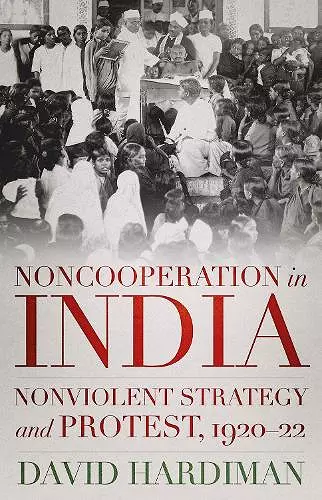Noncooperation in India
Nonviolent Strategy and Protest, 1920–22
Format:Hardback
Publisher:C Hurst & Co Publishers Ltd
Published:21st Jan '21
Should be back in stock very soon

The Noncooperation Movement of 1920-22, led by Mahatma Gandhi, challenged every aspect of British rule in India. It was supported by people from all levels of the social hierarchy and united Hindus and Muslims in a way never again achieved by Indian nationalists. It was remarkably nonviolent. In all, it was one of the major mass protests of modern times. Yet there are almost no accounts of the entire movement, although many aspects of it have been covered by local-level studies. This volume both brings together and builds on these studies, looking at fractious all-India debates over strategy; the major grievances that drove local-level campaigns; the ways leaders braided together these streams of protest within a nationalist agenda; and the distinctive features of popular nonviolence for a righteous cause. David Hardiman's previous volume, The Nonviolent Struggle for Indian Freedom, examined the history of nonviolent resistance in the Indian nationalist movement. The present volume takes his study forward to examine the culmination of this first surge of struggle. While the campaign of 1920-22 did not achieve its desired objective of immediate self-rule, it did succeed in shaking to the core the authority of the British in India.
'Hardiman is among the foremost scholars of modern South Asian history. This work is highly original--a careful, and thoroughly fair, assessment of nonviolent politics. Much more than a new summation of existing research, it significantly expands the scope of what is usually understood as the Noncooperation movement.' -- Partha Chatterjee, Senior Research Scholar in Anthropology and Middle Eastern, South Asian, and African Studies, University of Columbia, and author of 'A Possible India: Essays in Political Criticism'
'The most detailed and sophisticated study of Noncooperation yet. More than just an historical narrative timed for its centenary, Hardiman addresses the most important intellectual and political problems raised by the movement. Lucid, gripping, and wholly original.' -- Faisal Devji, Professor of Indian History and Director of the Asian Studies Centre, University of Oxford
'A vital, in-depth treatment of Noncooperation. Hardiman illuminates the politics of solidarity among Hindus, Muslims, and workers, the forging of unity and nonviolent discipline, and the tensions between ethical and strategic approaches to satyagraha. An important read for students of nonviolent resistance.' -- Erica Chenoweth, Professor, John F. Kennedy School of Government, Harvard University
'Examining the range of movements drawn into Non-Cooperation under Gandhi’s leadership, Hardiman shows how tensions among elite leaders, and between them and popular movements, made it impossible to transform the upheaval into a coherent national movement. A welcome analysis illuminating "non-violence" and the dynamics of Indian politics.' -- Judith M. Brown, Beit Professor Emeritus of Commonwealth History, University of Oxford
ISBN: 9781787384019
Dimensions: unknown
Weight: unknown
448 pages